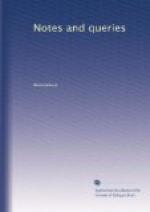W.S.
Richmond, Surrey.
Rodolph Gualter (Vol. iii., p. 8.).—
“Rodolph Gualter naquit a Zurich en 1519, et y mourut en 1586. Il fit ses etudes dans sa ville natale, a Lausanne, a Marbourg, et en Angleterre. Rodolph, son fils, mort en 1577, avait fait de tres bonnes etudes a Geneve, en Allemagne, et a l’universite d’Oxford.”
The above I have extracted from the account of him given in the Biographie Universelle, which refers as authority to “J.B. Huldrici Gualtherus redivivus seu de vita et morte Rod. Gualtheri oratio, 1723,” in the Biblioth. Bremens., viii. p. 635. In this memoir I find it stated:
“quod Gualtherus noster
una cum Nicolao Partrigio Anglo in Angliam iter
suscepit. Quatuor illud
mensibus et aliquot diebus finitum est,
inciditque in annum seculi
trigesimum.”
But neither in this, nor in the account of his life by Melchior Adam, nor in that contained in Rose’s Biographical Dictionary, can I find any trace of the opinion that he was a Scotchman; and as Huldricus was himself a professor in the Athenaeum at Zurich, he would probably be correctly informed on the subject.
TYRO.
Dublin.
"Annoy” used as a Noun (Vol. ii., p. 139.).—Your correspondent CH. will find three good instances of the use of the word annoy as a noun (in addition to the lines cited by him from Wordsworth) by Queen Elizabeth, George Gascoigne, and Mr. Keble:
“The doubt of future woes exiles
my present joy,
And wit me warns to shun such snares as
threaten mine annoy.”
See
Ellis’ Specimens of Early English Poets,
ii. p. 136.
{44}
“And as they more esteeme that merth
Than dread the night’s
annoy,
So must we deeme our dayes on erth
But hell to heauenly joye.”
Good
morrowe; see Farr’s Select Poetry, &c.,
p. 38.
“High heaven, in mercy to your sad
annoy,
Still greets you with glad tidings of
immortal joy.”
Christian
year, “Christmas Day.”
H.G.T.
Culprit, Origin of the Word (Vol. ii., p. 475.).—See Stephen’s Commentaries on the Laws of England, iv. 408. note (p).
C.H. COOPER.
Cambridge, Dec. 14. 1850.
Passage in Bishop Butler (Vol. ii., p. 464.).—The “peculiar term” referred to by Bishop Butler is evidently the verb “to Blackguard.” It is for this reason that he inserts the condition, “when the person it respects is present.” We may abuse, revile, vituperate an absent person; but we can only “blackguard” a man when he is present. The word “blackguard” is not recognised by Johnson. Richardson inserts it as a noun, but not as a verb.
L.
Wat the Hare (Vol. ii., p. 315.).—Your correspondent K. asks what other instances there are of Wat as the name of a hare? I know of one. On the market-house at Watton the spandrils of an Elizabethan doorway have been placed, taken from some old building in the town. This has a hare on one side, a ton on the other,—a rebus of the town name Watton.




